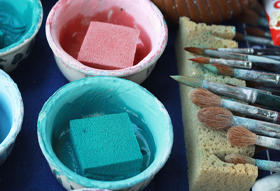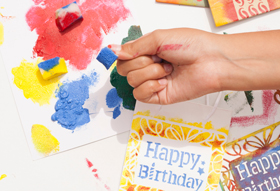
Foam crafting stamps

Making a stamp is likely to have been our earliest childhood experience of a craft activity. Making a potato stamp is a family favourite! Yet there are various ways in which DIY stamps can be made using a vast range of materials. From children’s craft activities and casual adult crafts such as DIY birthday cards, to larger projects and trade applications, foam is a versatile material for stamps and can be adapted accordingly to different projects.
That said, there are various types and densities of foam that are better suited to projects than others. For example, low to medium density polyurethane foam is the softest and most malleable, meaning it is best suited for children’s paint stamping. Given its low density, it is less accurate and therefore not suitable for a paint stamp project where accuracy is key. For projects requiring precision, we’d recommend a high to very high-density foam for printing. Likewise, for ink stamping on paper or fabric, or for stamp painting on furniture, we’d recommend selecting the highest density foam available – typically very high-density polyurethane.
The versatile qualities of foam make it incredibly easy to cut and shape with precision. For example, soft low-density foams are easy for children to cut with a pair of scissors into their desired shape. Higher-density foams can be precisely cut with a craft knife at home. However, if you are looking to create a larger stamp suitable for a commercial or larger project, our foam cut to size capabilities at eFoam can make this a reality. Simply send us a template of your desired foam shape with the required dimensions!

If you would like to create your own children’s foam stamp at home, we’d recommend using foam off-cuts or ordering a flat foam sheet that is approximately two centimetres deep. The size of this sheet will depend on the size of your stamp(s) and the number you would like to make. For children’s stamps, trace your required shape onto the sheet and cut out accordingly, before using a very thin layer of PVA glue to attach it to a piece of cardboard. Something relatively firm will suffice – a leftover cardboard box is perfect, and solid enough for a child to hold! Adults can have fun using foam stamps too for many crafting activities such as making your own greetings cards or personalized gift bags.
For professional or larger projects, order your high-density flat foam sheet in your required size. Depending on the medium you are to print with (i.e. trade wall paint or ink), select either a thicker 4cm sheet for industrial paint or a thinner 2cm sheet for lighter liquids such as ink. Proceed to stencil on your design as normal and cut out using a sharp craft knife for accuracy. It is important to mount your foam stamp on a rigid material in order to print with accuracy. For example, a clear plastic or resin sheet is appropriate if you’d like to see your exact placement when printing. Alternatively, for longer lasting and more premium looking foam stamps, you may wish to mount your stamp on a thin piece of wood.
Whatever you wish to achieve with your foam stamp, our friendly and knowledgeable representatives at eFoam are always on hand for any queries you may have. For assistance when ordering a foam sheet, or if you are wanting foam cut to size, please contact us today.

